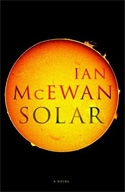by Rachel Luban
Ian McEwan’s novels are usually refreshingly humane. Solar is not. Its antihero, decaying Nobel laureate Michael Beard, is a selfish, womanizing physicist whose professional glory days are long over. When the novel opens he is the figurehead of an ineffectual center for renewable energy, his never-handsome appearance is on the decline, and his fifth marriage is imploding thanks to his many affairs. The war of attrition he and his wife wage against each other sets the tone for the novel. Their viciousness, often crossing the line into absurdity, simply isn’t funny enough to come off as satire, though. We know we’re in for a different kind of McEwan when, on a pit stop in the Arctic Circle, where he has gone to seek respite from the marital war zone, Beard believes the tip of his frozen penis has snapped off. But McEwan isn’t Hornby, and the scene induces cringing rather than laughter.
Other McEwan pleasures, abundant in Saturday and Atonement, have disappeared as well. The writing has the glib and glossy style of a magazine article—his facility has turned facile. He strains to find fresh descriptors—a dirty toilet shows “the chocolate arabesque of another man’s excrement.” An old man climbing stairs is “raising his body weight through the luxurious gravitational field.” The obvious pleasure McEwan takes in verisimilitude becomes tedious and showy here, as the pages detailing high-level physics accumulate. He even includes an appendix: the presentation speech in which Beard was awarded the Nobel.
McEwan’s novels generally revolve around an improbability, but usually they trace the confluence of events that makes the improbable an everyday occurrence. In Solar, the improbabilities abound and seem to exist solely to propel the plot. Perhaps most glaring is not the swerves of the plot, but the near-impossibility that so many women could be vying for the deeply unappealing Beard. Just because McEwan announces on the first page that Beard belongs to “that class of men—vaguely unprepossessing, often bald, short, fat, clever” who are “unaccountably attractive to certain beautiful women” doesn’t mean we believe him. His fatness and wanton eating and drinking belie no redeeming qualities, but (here’s a new one!) symbolize his deeper faults.
Every fifty pages or so you wonder how Beard can possibly redeem himself. As the book hurtles toward its conclusion, the chances seem ever slimmer, even as he attempts to “save the world” with solar power. It is to the book’s credit (indeed, it may be its own redemption) that to be redeemed is not the fate in store for Beard. At the book’s close, he suffers a torrent of misfortune that might be Job-like, except, as one of his colleagues points out, he “deserves almost everything that’s coming” to him. Perhaps, then, I was misreading the book all along, expecting the possibility of redemption McEwan usually offers—provisional, dubious, and ambiguous though it may be. But Beard stands for us, for the mess of our own making that is the warming planet, proclaiming ourselves saviors even as we bring ruin on our own heads. And that makes Solar a most sunless pronouncement on humanity.
This post may contain affiliate links.









